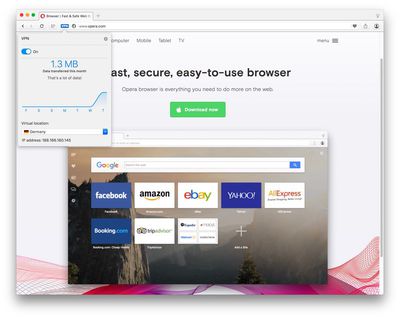Opera has warned users of the browser that an unknown hacker has managed to gain access to its sync system, potentially compromising the data of around 1.7 million users.
The Norwegian company said in a blog post that "some of our sync users' passwords and account information, such as login names, may have been compromised" following the hack, and encouraged users to reset passwords for third-party sites.

Although we only store encrypted (for synchronized passwords) or hashed and salted (for authentication) passwords in this system, we have reset all the Opera sync account passwords as a precaution.
We have also sent emails to all Opera sync users to inform them about the incident and ask them to change the password for their Opera sync accounts. In an abundance of caution, we have encouraged users to also reset any passwords to third party sites they may have synchronized with the service.
Opera's web sync feature lets uses synchronize their browser data and settings across multiple devices. Opera notes that the total active number of users of the feature in the last month is less than 0.5 percent of the web browser's user base of 350 million people, and that the password reset is a precaution.
Security scares have been a recurring theme for online services recently. Last week, Dropbox told its users that the firm was resetting passwords for anyone who had not changed theirs since mid-2012. The preventative measure was enacted after the company learned about an old set of user credentials that was stolen in a hacking incident nearly four years ago.























Top Rated Comments
Even only one of these two issues would have been a deal breaker for me.
Opera Sync and being Chinese owned? How do I know where my sensitive data really ends up? I really don't want it to somehow, one day end up in a country where the government is known to have deep ties into their cybersecurity business. Maybe it's stupid prejudices speaking here but they'd have to tear down the "Chinese Internet Firewall" at the very least before I'd start trusting them, and we all know that won't happen anytime soon.
So, now I mostly use Vivaldi ('https://vivaldi.com/'). It's what the Opera Reboot should have been anyway.
I switched from Chrome to Opera because it is more responsive than Chrome, it offers the same extensions that I relied on with Chrome, bookmark/history syncing across devices, and doesn't drain the battery like Chrome does on my OSX devices.
In my experiences Opera is superior to Chrome. (that's Opera and Chrome of today... historically that had not always been the case)
As for the breech, no company is immune.
The Chinese government will not regulate activities to safeguard the users, nor will not keep it private. No class lawsuits will occur, for the government has a hand in the data collecting, spying etc.
Too bad, will say, 'goodbye' to Opera. Like the option to block all ads.